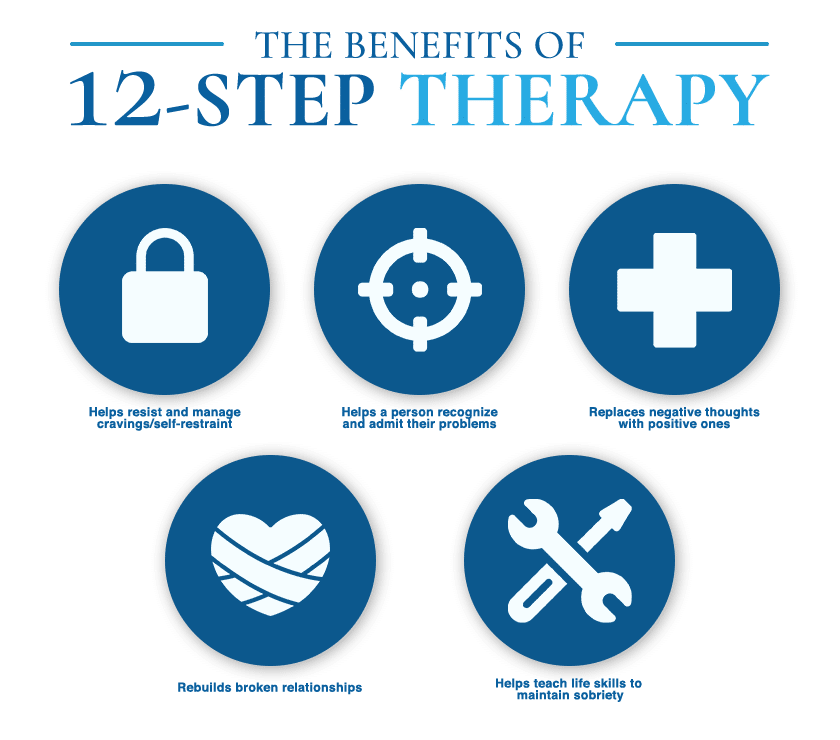One of the most commonly used treatments for drug and alcohol addiction is a 12-step therapy program. Utilizing this process is beneficial for many people and continues to be one of the most common treatment options in rehab centers all over the country. It has a proven track record for sustainable sobriety and changing lives for the better. Therapy programs may include the 12 steps as part of your addiction treatment program based on your individual needs.
At Chapters Recovery Center, our comfortable and modern treatment center employs 12-step therapies as part of our addiction treatment. We aim to provide Massachusetts residents with professional support and the best chance for long-lasting recovery. If you or a loved one is struggling with substance abuse, call us today. You can speak with our staff about our therapy programs and how they can help you maintain your sobriety for life.

What Is 12-Step Therapy?
The 12-step therapy program was developed by Bill Wilson, founder of Alcoholics Anonymous (AA), in 1938 after he wrote down his experiences with alcohol addiction. He saw how positive sharing struggles with substance abuse with others could be, along with giving yourself over to God, and formed the program around those principles.
The original program has heavy religious undertones and uses the Christian faith as part of the program. Today, there are variations on the program that focus more on spirituality rather than religion for those who shied away from the program because of their beliefs.
What Typically Happens During a Session in 12-Step Therapy?
During an average session, members of the group will typically share their experiences with drug addiction and recovery and provide peer support. The 12 steps will be discussed in detail, and members will be encouraged to work through the steps themselves. Sharing is a fundamental part of this therapy, and it is through sharing that members gain strength and support from each other.
How Effective Is 12-Step Therapy?
12-step therapy is effective in treating addiction and helping people maintain sobriety. In fact, research has shown that the 12 steps are just as effective as other forms of treatment, such as cognitive-behavioral therapy and other forms of individual counseling.
One of the reasons 12-step therapy is so effective is that it helps people to develop a support system. When people are struggling with substance abuse problems, they often feel isolated and alone. 12-step therapy provides them with a group of people who understand what they are going through and can offer support and advice.
Another reason 12-step therapy is effective is that it helps people to take responsibility for their recovery process. In 12-step therapy, members are encouraged to work through the steps at their own pace.
What Are The Success Rates of the 12 Steps?
There is no one definitive answer to this question as 12-step programs vary greatly in their approach and effectiveness. However, many program participants have found success in achieving and maintaining long-term recovery.
In an analysis of collected data from 27 previous studies, researchers found a 20% higher rate of abstinence for one year among people who attended AA or a 12-step program that encourages participation in AA.
The analysis found that AA and AA-connected 12-step programs had 20% improved abstinence rates over a period of 12 months compared to other drug rehab services. That effect remained constant at both 24 and 36 months.
If you or a loved one is struggling with drug abuse, don’t hesitate to reach out for help. 12-step therapy may be a helpful treatment option on your road to recovery.
The Value of a Support System During Drug and Alcohol Recovery
If you’ve isolated yourself from your family and friends, 12-step therapy can help you to develop a support system. Addiction recovery can be a lonely process, but 12-step therapy can provide you with the opportunity to meet new people and form lasting relationships. In 12-step therapy, members are encouraged to reach out to one another for support. This can be an invaluable source of strength during difficult times.
A support system can be a make-or-break factor in substance abuse recovery. If you have people to turn to for help and encouragement, you’re more likely to stay on track. 12-step therapy can provide you with the support you need to recover from substance abuse issues.
What Are Some Potential Drawbacks of 12-Step Therapy?
Some drawbacks of 12-step therapy include the fact that it is not always readily available, and that it can be expensive. Additionally, 12-step therapy does not work for everyone. Some people may find 12-step meetings to be helpful, while others may find them to be triggering.
If you are considering 12-step therapy, it is important to speak with your doctor or a mental health professional to see if it is right for you.
The 12 steps of a 12-step therapy program include:
- Admitting that your addiction has taken control of your life.
- Believing that a higher power can help.
- Deciding to give yourself over to that higher power.
- Look inward to take a personal inventory of who you are.
- Admitting to yourself, the higher power, and others about your addiction.
- Prepare for the higher power to help you remove character shortcomings.
- Ask the higher power to remove your shortcomings.
- Make a list of the things you did that hurt others, and be willing to make amends for the mistakes you made.
- Talk to those you hurt with direct contact unless doing so would cause further harm.
- Continue to take a personal inventory and admit that you were wrong.
- Through meditation and/or prayer, continue to enlighten yourself and remain within the higher powers’ presence.
- Share your success with others who need a 12-step therapy program.
Today, variations of AA exist to help other forms of addiction, like Narcotics Anonymous (NA), Heroin Anonymous (HA), and Gamblers Anonymous (GA).
Benefits of a 12-Step Therapy Program in New England
A 12-step therapy program can help patients surrender their substance use disorder, process their experience, and move forward into new patterns of thinking and action. You will build strong mental and emotional practices and tools that will help you maintain your sobriety for life. A few of the benefits of a 12-step therapy program in New England include:
- Learn to recognize and admit you have a problem
- Learn how to resist your cravings and improve your coping skills
- Replace negative thoughts and behaviors with positive recovery support
- Rebuild broken relationships
- Build life skills for maintaining your sobriety in everyday life
What is the Purpose and Overall Concept of the 12-Step Program?
The purpose and overall concept of the 12-step program is to help people struggling with addiction move forward into new patterns of thinking and action. 12-step therapy programs provide individuals with the skills and support needed to maintain sobriety for life.
Of those in their first month of AA meetings, 26% will still be attending at the end of that year. Of those in their fourth month of AA meeting attendance (i.e. have stayed beyond 90 days), 56% will still be attending AA at the end of that year.
How Long Can This Treatment Take?
The 12-Step treatment can last up to 12 weeks. This program is a flexible model that can be tailored to the needs of each individual. Treatment centers that utilize the 12 steps can allow people to work through each step at their own pace as they relate to other substance abuse treatment services. Each person utilizing the 12-step program will likely have a different experience than the next person.
What Are Some Examples of 12-Step Programs? (Alcoholics Anonymous, NA, etc.)
There are different forms of these programs, but they all share the same goal of helping the addict achieve and maintain sobriety. Some of the most popular 12-Step Programs include Alcoholics Anonymous (AA), Narcotics Anonymous (NA), and Al-Anon/Alateen (for family and friends of addicts).
Alcoholics Anonymous (AA)
Alcoholics Anonymous is a 12-Step fellowship for men and women who suffer from alcoholism. AA was founded in 1935 by Bill Wilson and Dr. Bob Smith, and today it is one of the most well-known 12-Step Programs.
Narcotics Anonymous (NA)
NA is a 12-Step fellowship for men and women who suffer from addiction to drugs. NA was founded in 1953, and today it has more than 61,000 meetings in 130 countries worldwide.
Al-Anon/Alateen (for family and friends of addicts)
Al-Anon is a 12-Step fellowship for family and friends of people struggling with substance use disorders. Alateen is a part of Al-Anon specifically for young people ages 12 and younger who may be affected by someone else’s drinking. Al-Anon was founded in 1951, and today there are more than 16,000 meetings in over 120 countries.
Cocaine Anonymous (CA)
Cocaine Anonymous is a 12-Step fellowship for men and women who suffer from addiction to cocaine and other drugs. CA was founded in 1982, and today there are more than 5,500 meetings in over 70 countries worldwide.
Gamblers Anonymous (GA)
Gamblers Anonymous is a 12-Step fellowship for men and women who suffer from gambling addiction. GA was founded in 1957, and today there are more than 3,000 meetings in over 50 countries worldwide.
What Types of Other Support Groups Are There That Are Not Based on Religion?
Many other support groups are not based on religion, including:
- SMART Recovery
- LifeRing Secular Recovery
- SOS Sobriety
- Women for Sobriety
Each person’s recovery journey is unique, so it’s important to find a support group that feels right for you. If 12-step therapy is not the right fit, there are many other options available.
If you or a loved one is struggling with addiction, don’t hesitate to reach out for help. There are many treatment options and support groups available to help you on your road to recovery.
Are There Online Resources Like 12-Step Recovery?
Online 12-step recovery programs are a great option for people who are not able to attend traditional in-person meetings. Telehealth and online support groups have become a convenient and effective way to connect with others in recovery.
How Does Holistic Addiction Therapy Compare to 12-Step Therapy?
Holistic addiction therapy is a type of treatment that focuses on the whole person, rather than just the addiction itself. This approach recognizes that addiction is just one part of a person’s life and that treating the whole person can lead to a more holistic and successful recovery.
12-step therapy is a type of treatment that follows the 12 steps of Alcoholics Anonymous. This approach focuses on admitting powerlessness over addiction, surrendering to a higher power, and taking action to change one’s life. 12-step therapy is effective for some people, but it may not be the right fit for everyone.
Both holistic addiction therapy and the 12-step program can be effective methods of treatment. The important thing is to find what works best for your needs.
12-Step Addiction Treatment Program Massachusetts
Chapters Recovery offers a 12-step program for your drug or alcohol addiction as part of our addiction treatment programs in Massachusetts. Depending on the severity of your substance abuse, your therapist will recommend one of the following treatment options:
- Partial hospitalization Program
- Intensive Outpatient Program
- Outpatient Treatment
We will be with you for every step of your addiction recovery, from start to continuing support whenever you need it. If you or someone you know is ready to find and maintain recovery, contact us today.



